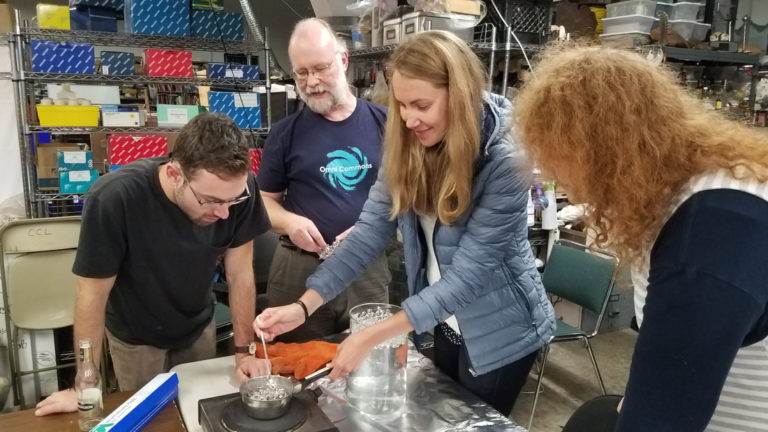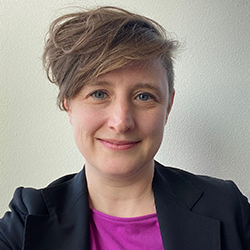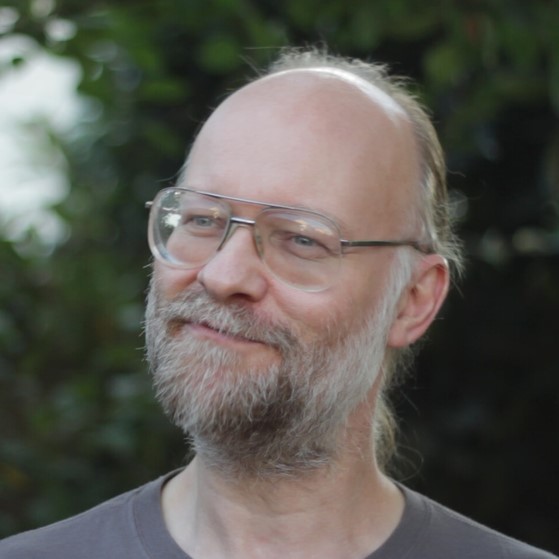
Over the years there has been an increasing interest in “citizen science” within biology, which has enabled data collection on a substantial scale as well as the opportunity for public engagement. Counter Culture Labs (CCL) in Oakland, CA is one example of a community lab for biotechnology and citizen science that focuses on diverse projects related to mycology, agriculture, fermentation, botany, food, and medicine. ESAL had the opportunity to speak with Patrik D'haeseleer, one of the original co-founders of the lab, and Jessica McGrath, the president of CCL to find out more about the facility and how they engage with the community and get the public excited in science!
RD: What is the overall mission of counterculture labs?
CCL: Our aim is to make everyone aware there is a space where anyone can come in and do biology, we endeavor to democratize access to biotechnology! We remove the barriers and the gatekeeping that often happens for science, such that members of the public can use scientific equipment. This all requires one to become a member of the lab, to use the space and to partake in safety vetting procedures! There is so much technology within the lab that is unused, and we not only explain, but practically demonstrate, what technologies are involved in what processes. In addition to access, we run several community projects that range from insulin development to creating real vegan cheese from cell cultures.
RD: How do you ensure continued engagement with the community?
CCL: We use membership to track engagement over time. Independent of technologies, our versatility was highlighted during COVID-19 when engagement declined. We then began weekly informational discussions where members of the community would come together and dissect what was ‘hype’ and what was ‘real’ science. This enabled attendees to understand the critical thought process required in science to assess the value of research and even data. Furthermore, given the magnitude of biotech in the news now, we have a lot of traffic – so we are staying very relevant, which results in greater engagement! As restrictions are being lifted, we intend to go into schools and work with at-risk kids to teach them about biotech careers. We are aiming to do more targeted outreach to specific communities to ensure our member base is drawn from a diverse community.

Jessica McGrath (Image Credit: Counter Culture Labs)
RD: Could you highlight a project or two that the community enjoys?
CCL: Open Insulin is one of our larger community projects where we are working to make open-source protocols and strains to produce low-cost insulin. We find that people are rationing their insulin as they are under-insured, and the price of insulin makes it unaffordable. This project is a great example of what community collaboration can do for the good of humanity, without a profit motive. This opens lines of inquiry that academic labs or big pharma would not pursue because it's against their interests.
The kombucha genomics project is another fun campaign where we study kombucha cultures from a variety of perspectives. We've done taste tests with kombucha using panels to fill out different flavor characteristics. However, we also have the tools to identify the strains in the starter culture and correlate those flavors with the species that are present. We have been teaching how to isolate individual species of bacteria or yeasts from kombucha culture, and have recently sequenced our first bacterial genome sequence from a kombucha isolate - it is essentially microbiology 101.
RD: How did COVID impact the practices of the lab?
CCL: Prior to COVID, we were already using Zoom and Google docs for most of our meetings, so luckily, we had the technology in place, so we could shift online – and it was not completely foreign. We were able to keep a good amount of our membership intact by still offering several events per week virtually. However, this did not retain all our membership, and given that was our main source of income to pay the rent we are now having to rebuild our membership and having more public events to reboot the interest. Nonetheless, we came through COVID better than many other labs. We did have a couple of projects that were deemed necessary for public health that were allowed in the lab on a very limited basis.
RD: What do you expect the lab to be in 5-10 years’ time?
CCL: Given that we were one of the first community labs on the scene in Oakland, we are still in initial growth stages. If you compare us to regular makerspaces and hackerspaces, they have a longer history. We hope to be better integrated with the community and provide more services. We also hope to develop collaborations and have a distributed network of service labs around the country. The next big movement is how do we organize ourselves and build resources so that all these community labs can interact with each other and best leverage what we all have.

Patrik D'haeseleer (Image Credit: Counter Culture Labs)
RD: What advice do you have for engineers and scientists that would like to get involved?
CCL: Feel free to join any of our online events listed on Meetup, or find your own local community lab. If you're interested in the growing community lab movement, keep an eye on the Global Community Bio Summit. It is a space for the global community of DIY biologists, community biologists, biohackers, biomakers and members of independent and community laboratories to convene, plan, build fellowship, and continue the evolution of our movement. This is an annual event where members share, discuss, and frame the future of independent research in the life sciences.
Are you involved with an organization or effort that you think might be of interest to the ESAL community? Or have heard about an organization or initiative that you’d like to learn more about? Let us know here, and we may feature it in a future post.